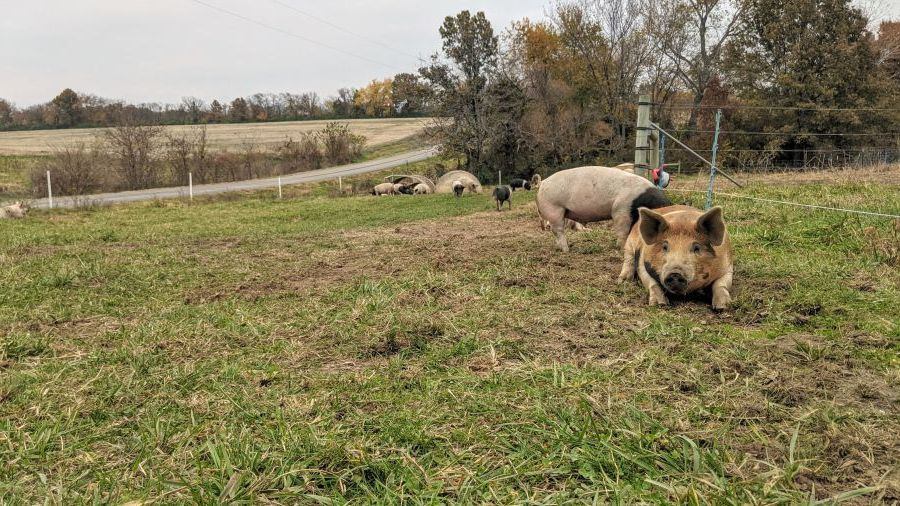Was Your Chicken Meant to Eat a Vegetarian Diet?
posted on
August 29, 2024

The truth is, most chickens in the US are not eating a vegetarian diet. And if they truly are vegetarian, then it's an indication of bigger problems. Let's look at what a vegetarian-fed chicken is, and the reasons why this is an unnecessary goal and somewhat bogus claim for poultry.
A Brief History of the Vegetarian-Fed Chicken
In the late 1900's, an outbreak of Bovine Spongiform Encephalopathy (I can't pronounce it either, so I call it BSE), commonly known as mad cow disease, was linked to infected animal by-products being fed to cattle.
Animal by-products are the surplus or waste products that result from the harvest and processing of fish and livestock. By the 1960s, these by-products, such as bones, blood, and meat scraps, had become a standard ingredient in animal feeds in many parts of the world thanks to their low cost and high nutritional value.
The first problem here is that cattle, as well as sheep, goats, and other ruminant animals, are herbivores; they were not created to eat animal-based foods at all. So consuming animal by-products goes against their God-given biology. At the same time many animals, including cattle and chickens, were being fed by-products of their own species. This is what led to the rapid spread of disease.
The outbreak of mad cow disease brought these feeding practices into a global spotlight and left many folks with a fear of animal by-products all-together. "Vegetarian-fed" became a marketing tool that appealed to those looking to purchase meats not fed animal by-products. The claim "vegetarian-fed" also gives customers the impression that the chicken's diet is cleaner or more natural.
What is a Chicken's Natural Diet?

Chickens will eat almost anything they find and acquire a taste for. They are NOT vegetarians by nature. They are omnivores, meaning they have the ability (and desire!) to consume and digest a wide variety of foods from both plant and animal species. They will naturally consume grains, seeds, insects, worms, and even small animals like field mice and frogs. They also eat rocks... Kait talks about that over here.
Because chickens were designed to eat an omnivorous diet, this variety of both plant and animal foods is crucial to their health and wellbeing. Just like you and me, they require a decent amount of fat and protein in their diet.
Chickens are also happiest when they get to forage and hunt for their food, which is why we love raising ours outdoors. You can't keep an outdoor-raised chicken from chasing an insect, although I'd pay to see you try!
What Does a Vegetarian-Fed Chicken Eat?
A vegetarian feed ration for a chicken is most often some combination of grains and seeds. This may include corn, barley, wheat, peas, soybeans, flaxseed, and sunflower seed. To compensate for the lack of animal-based nutrients, vegetarian-fed chickens are given other supplements, like limestone, which is high in calcium.
Funny thing is, many companies selling vegetarian-fed chicken will actually supplement them with insects like dried mealworms, even though a typical vegetarian diet for a human doesn't include insects. They do this because they realize the necessity of animal-based fats and proteins in a chicken's diet.
Some companies, like Natural Grocers, have even tried to enforce all of their poultry farmers to feed their chickens a vegetarian diet. They ended up settling for "not fed land animal-based products", to allow fishmeal to be included in the chickens diet to provide the necessary amount of animal-based protein.
Back to the claim though; "Vegetarian-fed"... Not just "vegetarian." That's because, like I said, you can't keep a chicken from hunting. Even a chicken raised in confinement will catch the occasional fly that finds its way inside.
What Does a David's Pasture Chicken Eat?
The best diet for a chicken is the one that is conducive to its God-given "chicken-ness". That's one of the primary reasons we raise our chickens - not just outdoors - but on pasture. We rotate all of our chickens on actual pasture (not just dirt) with only the exception of very young chicks or during periods of inclement weather. A healthy pasture offers vegetation, worms, insects... all of the above, so our chickens can hunt and forage for a portion of their diet.
Now because chickens don't naturally forage enough to produce an economically-viable product (meaning: you couldn't afford it) we also give our chickens a nutrient-dense feed ration of GMO-free grains, species-appropriate animal by-products, minerals, vitamins, and a probiotic blend. This ensures they are getting all of the micro- and macro-nutrients they need to stay well conditioned for egg and/or meat production.
But I Thought Animal By-Products Were Bad?
Animal by-products can be an ethical and beneficial part of a chicken's diet as long as they are species-appropriate and not disease contaminated. The animal by-products that have caused issues, like the mad cow disease outbreak, were contaminated with disease, and in some cases shouldn't have been fed at all. Cattle weren't intended to eat meat scraps from other cattle. But chickens can be fed these meat scraps as part of their natural diet.
The animal by-products that we use in our chicken feed include oyster shell and fishmeal. This powder, created from fish and fish by-products, is high in omega fatty acids and protein, and it helps keep our chickens in tip-top shape. It also provides a market for fish scraps and invasive species, or "trash fish", that would otherwise be wasted. Win-win!
Same goes for oyster shell. It provides a natural source of calcium when ground up for our chickens. We've personally gotten to witness our chickens eating snails and cleaning up crawdads on the farm, so we know oyster shell is a good fit.
Don't Let Label Claims Fool You. Know your farmer and know your food so you can feed your family with meats you can trust.
Thanks for reading!
Your farmer,
Remi Kesten


